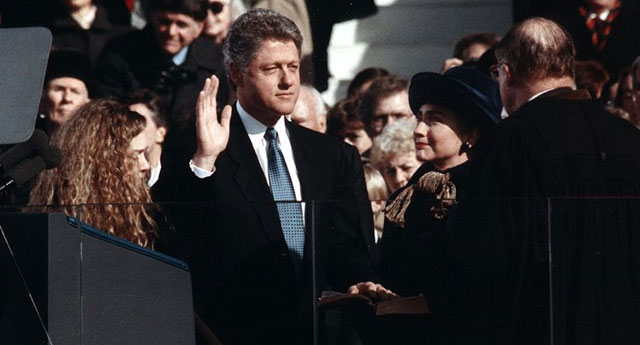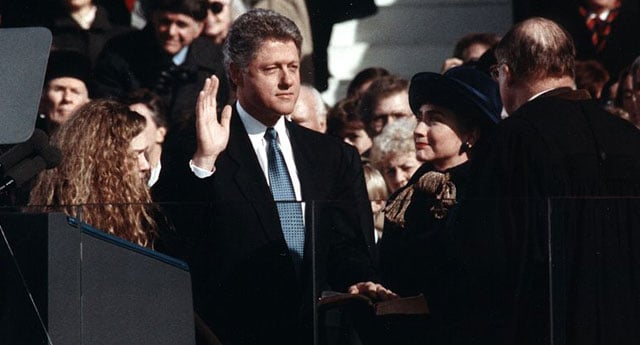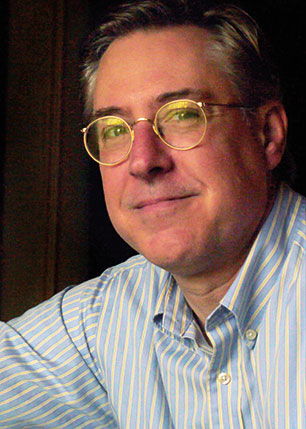
Part of the Series
Progressive Picks
Did you know that Truthout is a nonprofit and independently funded by readers like you? If you value what we do, please support our work with a donation.
 Bill Clinton, standing between Hillary Clinton and Chelsea Clinton, taking the oath of office of president of the United States on January 20, 1993. Clinton ran for president as a champion of the working class, but largely abandoned their economic interests while in office – preferring Wall Street to Main Street — beginning with his signing of NAFTA. (Photo: White House)
Bill Clinton, standing between Hillary Clinton and Chelsea Clinton, taking the oath of office of president of the United States on January 20, 1993. Clinton ran for president as a champion of the working class, but largely abandoned their economic interests while in office – preferring Wall Street to Main Street — beginning with his signing of NAFTA. (Photo: White House)
Thomas Frank, author of Listen, Liberal, discusses the Hillary Doctrine’s basis in neoliberalism, how the Democratic Party stopped governing on behalf of the working class and how President Bill Clinton’s major achievements actually enacted conservative goals, and ultimately hurt working people.
Mark Karlin: The innovation class, the creative class, the wealthy class, the professional class with Ivy League degrees: How did President Obama become the avatar for believing these groups should be the decision makers in government?
Thomas Frank: Obama thinks such people should be in charge because they came up through the same system as him. “Because he himself was a product of the great American postwar meritocracy,” his biographer Jonathan Alter writes, “he could never fully escape seeing the world from the status ladder he had ascended.”
Most of our other Democratic leaders (the Clintons, for example) came up the same way and believe the same thing. Indeed, what Alter describes is standard-issue stuff for Democrats these days. The Democrats are a class party in the fullest sense of the phrase, and the class whose perspective they reflect and whose interests they serve is the highly educated, white-collar professional class. Theirs is a liberalism of the rich.
Can you describe a little about what you call “The Hillary Doctrine,” including how microlending is a good example of her belief in opening doors of entrepreneurship to solve the world’s economic problems?
The Hillary Doctrine was Clinton’s understanding of American national interest when she served as Obama’s secretary of state. The idea was that the US would henceforth be the world’s defender of women and girls. Hillary didn’t mean this in a general sense, however. The kind of women we were committing ourselves to specifically were female entrepreneurs.
 Thomas Frank. (Photo: Bonkeeyi)The source of this notion of liberation through female entrepreneurship is the microlending movement, in which Hillary has been an enthusiastic participant for many decades. It arose as part of neoliberalism in the 1990s: The IMF [International Monetary Fund] and World Bank would “structurally reform” a country’s economy, and to help out with the human dislocation that resulted, they would give microloans to small entrepreneurs, who were encouraged to start tiny businesses like gardening or handicrafts. Over the years, the microlending movement accreted all these details: The entrepreneurs had to be women. They had to be hooked up to a bank. They had to have a Western mentor. They had to have smartphones. And so on.
Thomas Frank. (Photo: Bonkeeyi)The source of this notion of liberation through female entrepreneurship is the microlending movement, in which Hillary has been an enthusiastic participant for many decades. It arose as part of neoliberalism in the 1990s: The IMF [International Monetary Fund] and World Bank would “structurally reform” a country’s economy, and to help out with the human dislocation that resulted, they would give microloans to small entrepreneurs, who were encouraged to start tiny businesses like gardening or handicrafts. Over the years, the microlending movement accreted all these details: The entrepreneurs had to be women. They had to be hooked up to a bank. They had to have a Western mentor. They had to have smartphones. And so on.
You can see the appeal of this movement: It’s telling you that the solution to poverty is not unions or government or anything like that, but for everyone to work hard and start their own businesses — and, incidentally, to extend the reach of Western financial institutions to every village on the planet. A pure win-win. Everyone feels good. Everyone feels virtuous.
Except for the people who live in those countries, of course, because they know it doesn’t work. You don’t build a country’s economy by having everyone buy a goat and sell milk to one another. All these people have to show for this strategy is debt. Some empowerment.
I was captivated by your description of Hillary Clinton being surrounded by a “microclimate of virtue.” Can you describe what you mean by that and how it was represented in your section, “No Ceilings,” that included Melinda Gates and a panel to show how much women in power “cared” for poor women? I love your sardonic description, “the presenters called out to one another in tones of gracious supportiveness and flattery so sweet it bordered on idolatry.”
Every biography of Hillary Clinton talks about her goodness, her high-mindedness, her rock-solid dedication to principle. Reading those books, I couldn’t imagine what they meant, since Hillary is as much of a shape-shifter and a compromiser as any other politician.
When I saw her in person, however, it all made sense. It was at a Clinton Foundation event, as you mention. Everyone took their turn on the stage, praising everyone else, in the highest and most gracious forms you can imagine. There was an almost intoxicating sense in the room of the goodness and virtue of everyone present, with Hillary herself anchoring the swirl. It must be hard for someone who wasn’t there to believe, but these people seemed to regard her with an idealism that was almost cult-like.
The exaggeration of it all showed me that this sense of virtue is not only central to Hillary Clinton’s appeal, but to liberalism generally. This is a movement that has done tremendous harm to minorities and working people over the last few decades, and yet liberals have such an elevated sense of what fine people they are. It is a precious self-image.
You trace the modern abandonment of working men and women by the Democrats to a book by Fred Dutton in 1971. Can you explain the tome and its implications?
Dutton was a high-ranking Democratic Party official who later became a prominent Washington lobbyist. Among other things, he served on the McGovern Commission, which worked to reorient the Democratic Party away from labor and working people. Dutton’s book was called Changing Sources of Power, and it was sort of an explanation of why the McGovern Commission did what it did. Basically, Dutton was one of those establishment people who were simply bowled over by the sheer righteousness of the youth movements of the 1960s — something I also found a lot of in the advertising industry in my first book, The Conquest of Cool. The kids were so wise and so profound, Dutton thought. They had brought politics to a whole new philosophical level. And, meanwhile, as everyone could see, working people were so backward and so ugly, supporting the Vietnam War and all that stuff. Of course you wanted to ditch one group and embrace the other.
Given what was going on back then, it’s easy to understand why Dutton felt as he did. He wasn’t totally wrong about blue-collar workers and the Vietnam War, for instance. But turning your back on the concerns of working-class organizations for whatever reason meant turning your back on their issues, with consequences that are all too clear today.
You argue the abandonment of labor by the Democrats came to full fruition in the two administrations of Bill Clinton? How did Clinton who came from a working-class upbringing eventually betray the workers of the United States?
First of all, I’m not so sure about his background. It is true that he came from a very poor state, and that his family struggled, but Clinton’s biographers always emphasize that he wasn’t really of the working class: He always drove a new Buick, etc.
Clinton never had a really great relationship with workers’ organizations, but the worst thing Clinton he did to them was NAFTA. There were many trade agreements, of course, but NAFTA was the one that mattered, both because it was the first one and because labor put everything into stopping it. Indeed labor had stopped it when George H. W. Bush tried to get it through Congress. Clinton got it done, however, with a little muscle and a vast fog of preposterous claims about how NAFTA would increase exports and manufacturing employment.
His admirers saw NAFTA as his “finest hour,” because he had stood up to a traditional Democratic constituency. What an achievement. NAFTA handed employers all over America the ultimate weapon against workers: They could now credibly threaten to pick up and leave at the slightest show of worker backbone — and they make such threats all the time now.
How did the Clinton administration become a surrogate of Wall Street, resulting in the far-reaching repeal of the Glass-Steagall Act?
In 1992, Clinton ran as a populist, deploring income inequality, but that was just an act. As president he seems immediately to have decided to cast his fortunes — and those of his party — with Wall Street. Bank deregulation was a persistent policy of his from the very beginning — he signed the Riegle-Neal Act in 1994, for example, and the Mexican bailout (a big favor to Wall Street) came shortly thereafter. Along the way, he helped bail out a too-big-to-fail hedge fund, he twice appointed Alan Greenspan to run the Federal Reserve and he ensured that certain derivative securities would not have any kind of federal supervision at all.
At the time, Clinton’s admirers thought this record was something to boast about. He had brought his party out of the Rooseveltian dark ages and had embraced modernity, etc.
Why did he do it? My explanation is simple class identification. Clinton’s real class story has to do with his career in college and graduate school, where he became a star of the rising professional cohort. People with this kind of background saw (and still see) Wall Street as a part of the enlightened world, a part of the world inhabited by people just like them. They’re so smart! Plucking wealth from thin air!
This is a little off message regarding the book, but can you speculate why the Republicans were so obsessed with removing Clinton from office when he was fulfilling so much of the GOP agenda, including negotiating with Newt Gingrich about cutting Medicare and Social Security?
“Fulfilling so much of the GOP agenda”: That is a point worth reiterating. Clinton had five major achievements as president: NAFTA, the Crime Bill of 1994, welfare reform, the deregulation of banks and telecoms, and the balanced budget. All of them — every single one — were longstanding Republican objectives. His smaller achievements were more traditionally Democratic (he raised the earned-income tax credit and the minimum wage), but his big accomplishments all enacted conservative wishes, and then all of them ended in disaster.
So why did the right try so hard to get rid of him? For one thing, because they always do that. They never suspend the war or stop pushing rightward. There is no point at which they say, “OK, we’ve won enough.” For another, because Gingrich couldn’t control the rank and file, a problem that persists to this day.
The final conservative consequence of the impeachment, although this one was surely not intended: impeaching Clinton made him a martyr and hence a hero to Democrats. It secured his family’s and his faction’s grip on the Democratic Party apparently forever.
You write in your last chapter: “And every two years, they [the Democrats] simply assume that being non-Republican is sufficient to rally the voters of the nation to their standard.” That sure sounds to me a bit like Hillary Clinton’s basic pitch (paraphrased): “I’m not going to get a lot done because that’s reality, but I’ll be sitting in the Oval Office instead of that demagogue Trump. So vote for me.” Any resonance there?
That is exactly how I meant it, although of course I couldn’t see that Trump was going to be the GOP nominee when I was writing the book.
Is the Acela Express the main transportation route between lawmakers, regulators, lobbyists and financiers?
The Acela runs between Washington and New York just a little bit faster than the ordinary Amtrak train. It costs much, much more, however. Because once you’re on that Acela train, you’re instantly in the secured precincts of the tidy and prosperous professional class. All these nicely dressed people typing away on their keyboards. People looking over spreadsheets. People reading management books and talking management talk. People flattering each other. People shushing each other in the quiet car. Shushing each other so vehemently I once saw a quiet car dispute almost turn into a fistfight. It is literally the express train of the class war. Every sort of narcissism and upper-class social pathology is on full display.
A few weeks ago on the Acela train, I sat near a man who seemed to be some sort of Hillary Clinton adviser. He was talking very loudly on his cellphone about her latest TV commercial, about how she was finding her own voice, which sounds banal but which I guess is a good thing to do if you want to be president of the United States.
When you end with a rather pessimistic notion that the betrayal of the Democrats in power will not easily change, you state “that the problem is us.” Who are you referring to as “us”? Liberals? How does the Bernie Sanders movement that came near to toppling Clinton Inc. fit into your answer?
“The problem is us” in the sense that liberalism is dominated by a certain class outlook and that I am part of that class. I am calling on other members of that class to look in the mirror and understand who they are — that they are just as much products of their economic position as are the blue-collar workers they so hate. In particular, I am calling on them to understand that they aren’t the fine and virtuous people they believe they are. That it is because of them that inequality is out of control, that Wall Street is wrecking the world, that middle-class America is falling apart. And that they have an obligation to do something about it.
I like to think that Bernie is saying the same thing, in his own way.
Trump is silencing political dissent. We appeal for your support.
Progressive nonprofits are the latest target caught in Trump’s crosshairs. With the aim of eliminating political opposition, Trump and his sycophants are working to curb government funding, constrain private foundations, and even cut tax-exempt status from organizations he dislikes.
We’re concerned, because Truthout is not immune to such bad-faith attacks.
We can only resist Trump’s attacks by cultivating a strong base of support. The right-wing mediasphere is funded comfortably by billionaire owners and venture capitalist philanthropists. At Truthout, we have you.
Truthout has launched a fundraiser, and we have only 72 hours left to raise $24,000. Please take a meaningful action in the fight against authoritarianism: make a one-time or monthly donation to Truthout. If you have the means, please dig deep.